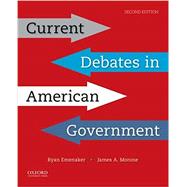Ideal for introductory courses, Current Debates in American Government presents over 50 lively readings drawn from major news sources including: The Economist, The Washington Post, NPR News, The New York Times, and The New Yorker. The authors selected these readings to introduce students to key debates in American politics and to help them better understand how these issues and debates affect their own lives.
Current Debates in American Government, Second Edition, is a perfect companion to Morone/Kersh's textbook, By the People: Debating American Government, Third Edition, (OUP, 2016), as its selections are organized thematically into sections that correspond to the chapters in that text.








